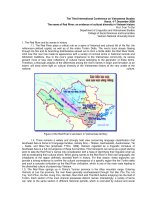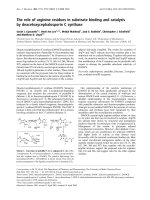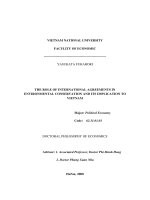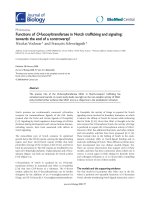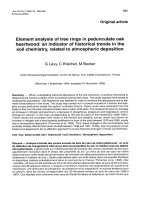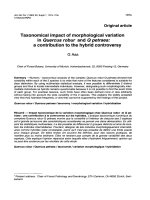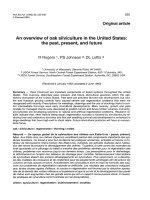Edited the empire on which the sun never sets an evolution of british empire in the 19th and 20th century
Bạn đang xem bản rút gọn của tài liệu. Xem và tải ngay bản đầy đủ của tài liệu tại đây (75.91 KB, 2 trang )
"THE EMPIRE ON WHICH THE SUN NEVER SETS"
AN EVOLUTION OF THE BRITISH EMPIRE IN THE 19TH AND
20TH CENTURY
It was said that 'the sun never sets on the British Empire' because its
extent crossed the globe assured that the sun was always shining on at least
one of its diverse colonies or governed nations. Its power and influence
spread all over the Earth for centuries. For better or worse, it had a significant
influence on the history of the world, especially in the 19th and 20th century.
Figure 1: Rise & Fall of British Empire
In the century 1815–1915, at its peak, British Empire was
acknowledged as the largest Union in history and, for over a century, was the
principal global leadership. By 1913 the British Empire governed over 412
million people as 23 percent of the global population, and by 1920 it covered
35,600,000 km2 (13,730,000 sq mi), 24 percent of the Earth's total area. By
the British Empire Exhibition of 1924, Britain dictated a universal empire that
covered a fifth of the land in the world. Numerous British individuals at the
time invested heavily in the British Empire and its force. In any case, this was
not a view shared by individuals of the colonized terrains. Many people living
in British colonies suffered political and economic disparity and declining
their culture and religion.
Most British individuals at the time believed that they were doing the
right thing by taking the British government and Christianity to the rest of the
world, ending slavery and barbaric traditions and bringing 'civilisation' and an
international 'Pax Britannica', or 'British peace'. The British generally felt that
how they carried on with their lives was the correct way. They accepted that
colonizing different nations was a method for helping other people become
like Britain and improve.
After World War One(1919), it became increasingly challenging for
Britain to continue to the Empire. It became apparent that: Britain could no
longer afford an empire, Britain had no right to govern people who did not
want to be ruled by Britain. Britain understood that the Royal Navy was not
sufficiently able to ensure all the Empire anyplace on the planet. As a result,
the British Empire was dismantled and replaced by a voluntary organization
of former colonies.
Following World War II, nationalism predominated in numerous
nations. A large portion of the British Empire was consequently granted
liberation. The British public, presently not effectively royal in its opinions,
acknowledged the possibility of freedom as an inevitable result. Many newly
self-governing countries entered The Commonwealth of Nations, a free
association of independent states. Today practically nothing remains of the
British Empire.

